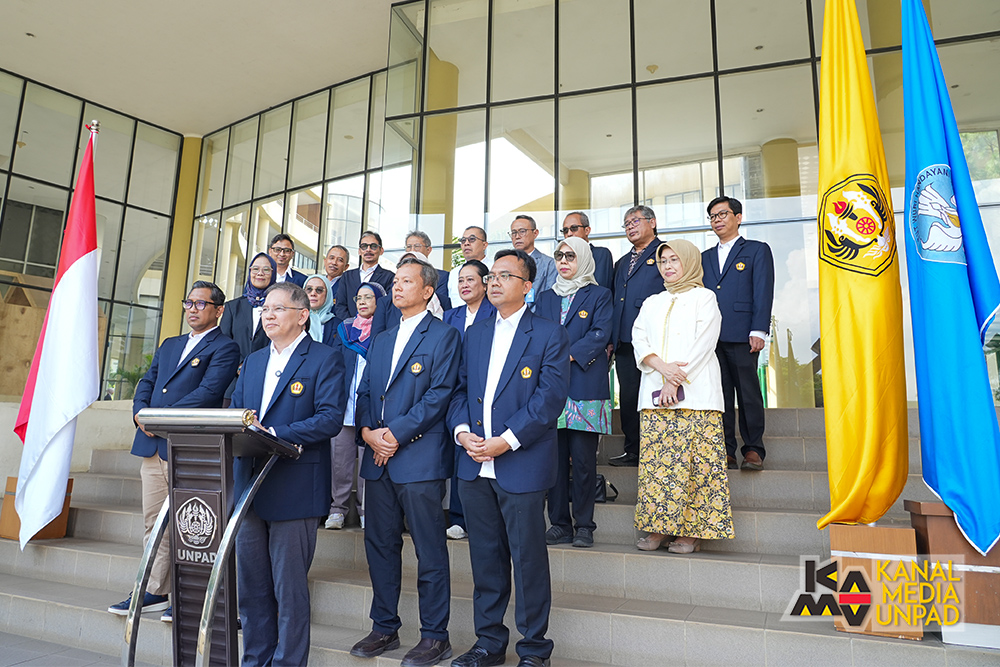
Penetapan Dekan Fakultas & Sekolah Terpilih Periode 2026–2030 Universitas Padjadjaran
Universitas Padjadjaran resmi menetapkan jajaran Dekan Fakultas dan Sekolah yang akan memimpin periode 2026–2030. Penetapan ini merupakan bagian akhir dari rangkaian proses pemilihan pimpinan yang dilakukan secara transparan, akuntabel, dan berdasarkan prinsip tata kelola universitas yang baik.
Bandung – Universitas Padjadjaran kembali melanjutkan komitmennya dalam penguatan tata kelola kelembagaan melalui penetapan Dekan Fakultas dan Sekolah terpilih untuk masa jabatan 2026–2030. Proses pemilihan ini menjadi tahapan strategis untuk memastikan keberlanjutan kepemimpinan akademik yang berkualitas, inovatif, dan berorientasi pada misi pendidikan tinggi yang berkelanjutan.
Proses Pemilihan yang Transparan dan Terstruktur
Tahapan pemilihan dilakukan secara berjenjang meliputi:
-
Penjaringan bakal calon dekan,
-
Verifikasi administrasi,
-
Penyaringan dan penilaian oleh Panitia Pemilihan,
-
Sidang Senat Akademik, dan
-
Penetapan resmi oleh Pimpinan Universitas Padjadjaran.
Seluruh proses dijalankan dengan menjunjung tinggi prinsip transparansi, inklusivitas, dan integritas akademik. Unpad memastikan bahwa setiap fakultas dan sekolah mendapatkan figur pemimpin yang memiliki visi strategis untuk mendukung peningkatan kualitas pendidikan, penelitian, dan pengabdian kepada masyarakat.
Dekan Fakultas dan Sekolah Terpilih Periode 2026–2030
Dalam pengumuman resmi, Unpad menampilkan nama-nama pimpinan fakultas dan sekolah yang terpilih untuk memimpin lima tahun mendatang. Penetapan ini juga menjadi momentum bagi masing-masing unit akademik untuk membangun strategi keberlanjutan dan memperkuat kualitas layanan pendidikan.
Nama-nama pemimpin fakultas dan sekolah terpilih adalah sebagai berikut:
-
Fakultas Ekonomi dan Bisnis – Prof. Mohamad Fahmi
-
Fakultas Farmasi – Prof. Auliya Abdurrohim Suwantika
-
Fakultas Hukum – Raden Achmad Gusman Catur Siswandi, Ph.D.
-
Fakultas Ilmu Budaya – Prof. Aquarini Priyatna
-
Fakultas Ilmu Komunikasi – Dr. Nindi Aristi
-
Fakultas Ilmu Sosial dan Ilmu Politik – Prof. Mohammad Benny Alexandri
-
Fakultas Kedokteran – Prof. Vitriana
-
Fakultas Kedokteran Gigi – Prof. Dudi Aripin
-
Fakultas Keperawatan – Windy Rakhmawati, Ph.D.
-
Fakultas Matematika dan IPA – Prof. Desi Harneti Putri Huspa
-
Fakultas Perikanan dan Ilmu Kelautan – Dr. Sunarto
-
Fakultas Pertanian – Dr. Ahmad Choibar Tridakusumah
-
Fakultas Peternakan – Prof. Rahmat Hidayat
-
Fakultas Psikologi – Dr. Retno Hanggarani Ninin
-
Fakultas Teknik Geologi – Dr. Boy Yoseph Cahya Sunan Sakti Syah Alam
-
Fakultas Teknologi Industri Pertanian – Dr. Gemilang Lara Utama Saripudin
-
Sekolah Pascasarjana – Prof. Vijaya Isnaniawardhani
-
Sekolah Vokasi – Dr. Kurniawan Saefullah
Harapan, Arahan, dan Pesan Rektor
Rektor menyampaikan apresiasi dan selamat kepada para Dekan terpilih. Dalam arahannya, beliau menegaskan bahwa jabatan ini merupakan amanah besar yang harus dijalankan dengan:
-
integritas,
-
keberanian,
-
keteladanan, dan
-
komitmen terhadap nilai-nilai akademik dan keilmuan.
Beliau juga menekankan bahwa Unpad membutuhkan pemimpin yang tidak hanya kompeten, tetapi juga visioner dan siap bekerja bersama mendorong universitas menjadi lembaga yang unggul, inklusif, dan berdampak bagi bangsa.
Rektor turut mengucapkan terima kasih kepada seluruh dosen, tendik, dan mahasiswa atas partisipasi aktif dalam proses pemilihan. Beliau mengajak seluruh sivitas untuk kembali bersatu mendukung para dekan terpilih dalam membangun Unpad yang lebih tangguh dan relevan di masa depan.
Penguatan Kepemimpinan Akademik
Penetapan Dekan periode 2026–2030 diharapkan dapat menjadi energi baru dalam memperkuat kualitas akademik, meningkatkan kolaborasi riset, memperluas jejaring internasional, serta mempercepat transformasi digital di setiap fakultas dan sekolah di lingkungan Unpad.
FK Unpad menyambut baik penetapan pimpinan baru ini dan siap berkolaborasi untuk mendukung agenda strategis universitas demi menciptakan pendidikan kedokteran yang berdaya saing global serta memberikan manfaat nyata bagi masyarakat.





